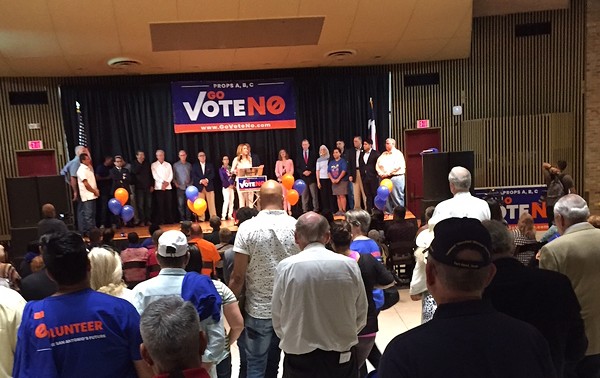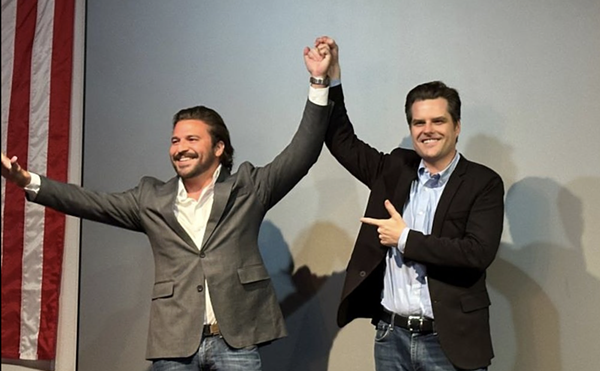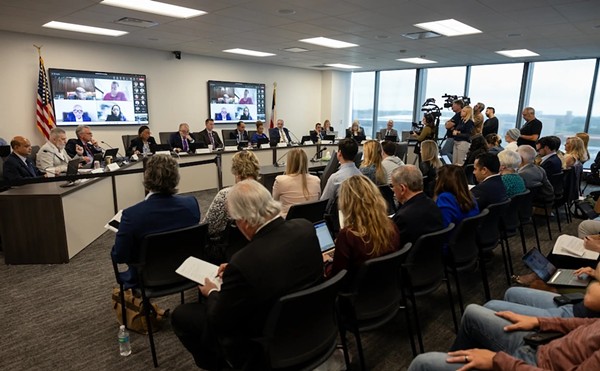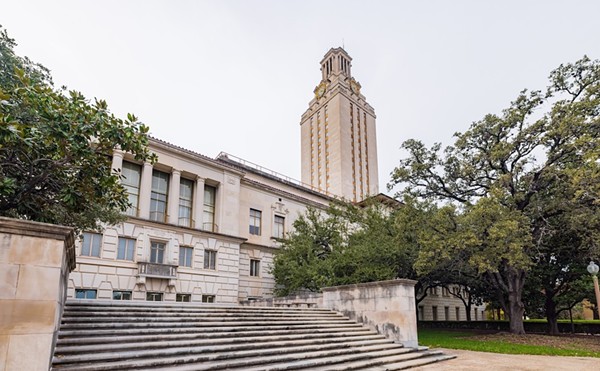Last Saturday morning, several members of San Antonio’s politico-business complex directed speeches at 200 or 300 people, many of whom had been munching on free breakfast tacos a few minutes before the event started at La Villita Auditorium.
Lemonade was among the drink choices. Somebody I was chatting with after the campaign rally – which portrayed the fire union’s three city charter amendments on the November 6 ballot as the instruments of our demise, the meltdown that would turn our city into a kind of Chernobyl, but probably without
The speakers included developer and philanthropist Gordon Hartman, USAA executive Wayne Peacock and Mayor Ron Nirenberg. Jenna Saucedo-Herrera, president of the San Antonio Economic Development Foundation, emceed the event. In other words, this could just as easily have been the kickoff of a bond campaign or a drive to further relax city council’s term limits.
The only speaker who didn’t fit comfortably into the usual-suspect category was Tony Gradney, owner of Tony G’s Soul Food on the East Side. As a journalist, I generally avoid speculation. But I feel comfortable speculating that, at some point, somebody on stage shook his hand, leaned in and whispered enthusiastically, “Welcome to the club, Tony… I like your signature chipotle grits.”
This was one of the things Gradney told the audience: “If these amendments pass, it would mean less money available for improvements in our neighborhoods.”
To be clear, none of the proposed amendments literally say “divert tax revenue from neighborhood improvements.” Honestly, who would vote for that? No, opponents of these amendments, including Gradney, mostly talk about what they believe will be the effects. They rarely talk about the cause – that is, the actual charter changes. That habit stems from the campaign rule of never mentioning your opponent by name, even if your opponent is a proposition.
Here’s a recap of the causes of the effects the Go Vote No campaign is afraid of: one amendment would cap future city managers’ salary and impose a limit of eight years on the job; one would require the city and unions to take contract disputes to a mediator, not the courthouse; another would make it easier to challenge city ordinances, including city council’s spending decisions, through public referendum.
Getting back to the rally, a ring of other bigwigs stood quietly on the stage, looking somberly at the back of whoever was at the podium and trying not to do anything weird with their hands.
When it was Hartman’s turn to speak, the good-guy creator of Morgan’s Wonderland for kids with special needs raised the specter of one neighborhood collecting enough signatures to force a public vote to take away funding for streets or sidewalks or whatever in another neighborhood.
“Do we really want to put neighborhood against neighborhood? District against District?” Hartman said. “We’re not a community that divides.”
Except when it comes to income – then we totally divide. That’s according to several recurring surveys that name San Antonio as one of the most economically segregated cities in the country. To be clear, Hartman did not make that point. I did, just now.
Hartman also said this: “I have to tell you – I don’t really get involved in politics. It’s not my thing.”
This is where it got awkward. He said this at a political rally, and he is the treasurer of Secure San Antonio’s Future, which is a political action committee that’s bankrolling the Go Vote No campaign. Also, he probably had something to do with convincing the city and county to pay $9 million each to take the Toyota Field soccer stadium off his hands in 2015.
Or maybe not. Who’s to say?
There was another moment during the rally that made me pause, this one more weird than awkward. It arrived when USAA’s Peacock said during his speech, “San Antonio is the only large city to have a Triple-A bond rating.”
That wasn’t strange in itself. Politico-business opponents of the amendments often talk about how they would weaken the city manager’s and council’s hand, prompting credit-rating agencies to downgrade the city’s bond rating. That, in turn, would result in millions of dollars every year in additional interest payments on the city’s municipal debt. A cascade of shit, as it’s known.
The weird part was that people applauded Peacock when he indulged in the kind of civic pride that investment bankers and portfolio managers savor most.
As far as the rally’s attendees, well, it’s almost always a bad idea to generalize about a couple of hundred people sitting in the same place at the same time. But I have a lucky feeling about this generalization: They were, shall we say, more mature than San Antonio at large, a little grayer at the temples than you’d expect to see in a typical gathering of residents.
These older people are commonly referred to as voters.
This observation was going to be my gotcha moment with Nirenberg in the post-rally interview. But he ruined it by disagreeing with me instead of just fessing up, embarrassed but willing to admit it was a pretty traditional crowd for a campaign rally. “I saw a lot of young people,” the mayor said, scanning the room for the throng of millennials who would prove me wrong. That guy.
Why was the crowd’s maturity going to be at the heart of my gotcha question? Because opponents will need new, younger voters to show up for election day. (Our democracy could use the pick-me-up, too.)
Still, Nirenberg addressed the issue despite screwing up my moment.
“The truth of the matter is that a lot of new voters will go to the polls because of what’s happening on the (general election) ballot,” he said. “Our job now is to inform every single person within earshot about the impacts of these propositions. Assuming they will vote, we want to make they will cast an informed vote.”
Yet, the politics-as-usual feel of Saturday’s event seemed flat-footed.
Leaders of the San Antonio Professional Firefighters Association are looking to tap into legitimate concerns about City Manager Sheryl Sculley’s compensation and the power she’s amassed
Yes, the union’s rhetoric has been Trumpian and misleading, and the amendments would make
But if the Saturday event is a preview of the forthcoming Go Vote No effort, they might as well call in Hillary Clinton’s campaign consultants for their sage, if costly, advice.
Stay on top of San Antonio news and views. Sign up for our Weekly Headlines Newsletter.



















